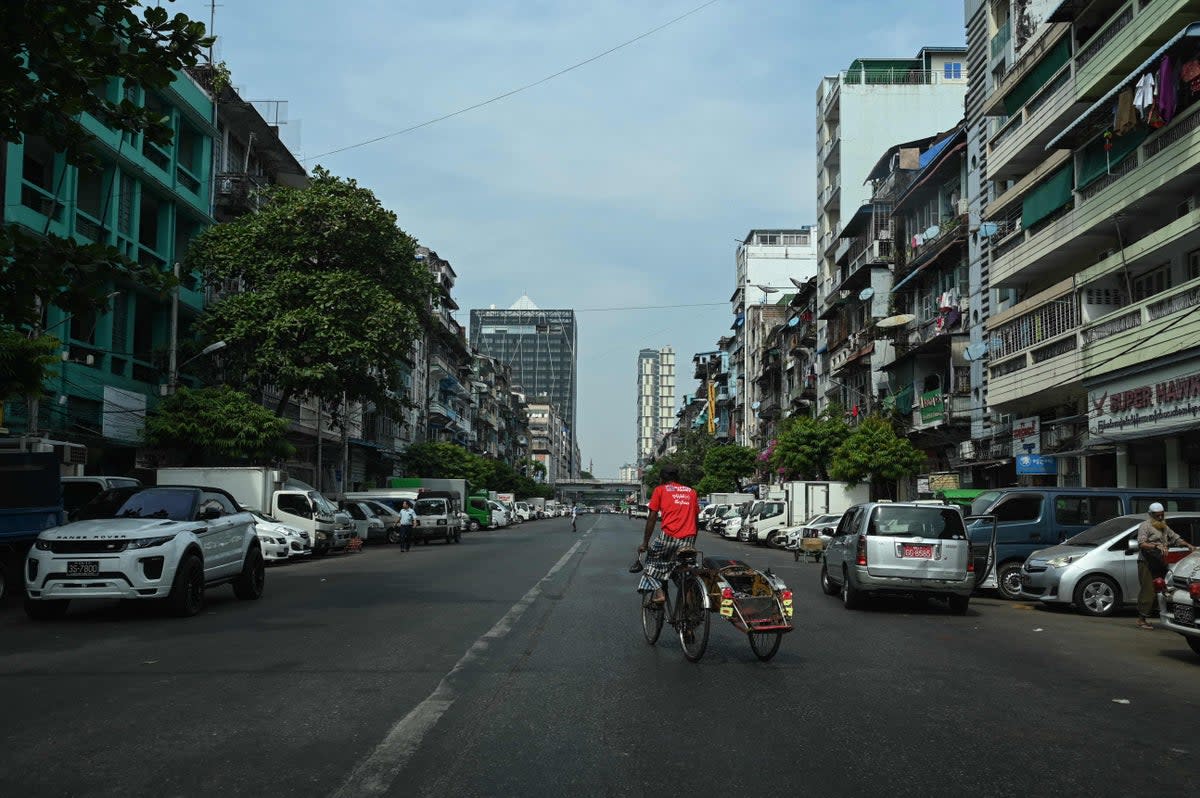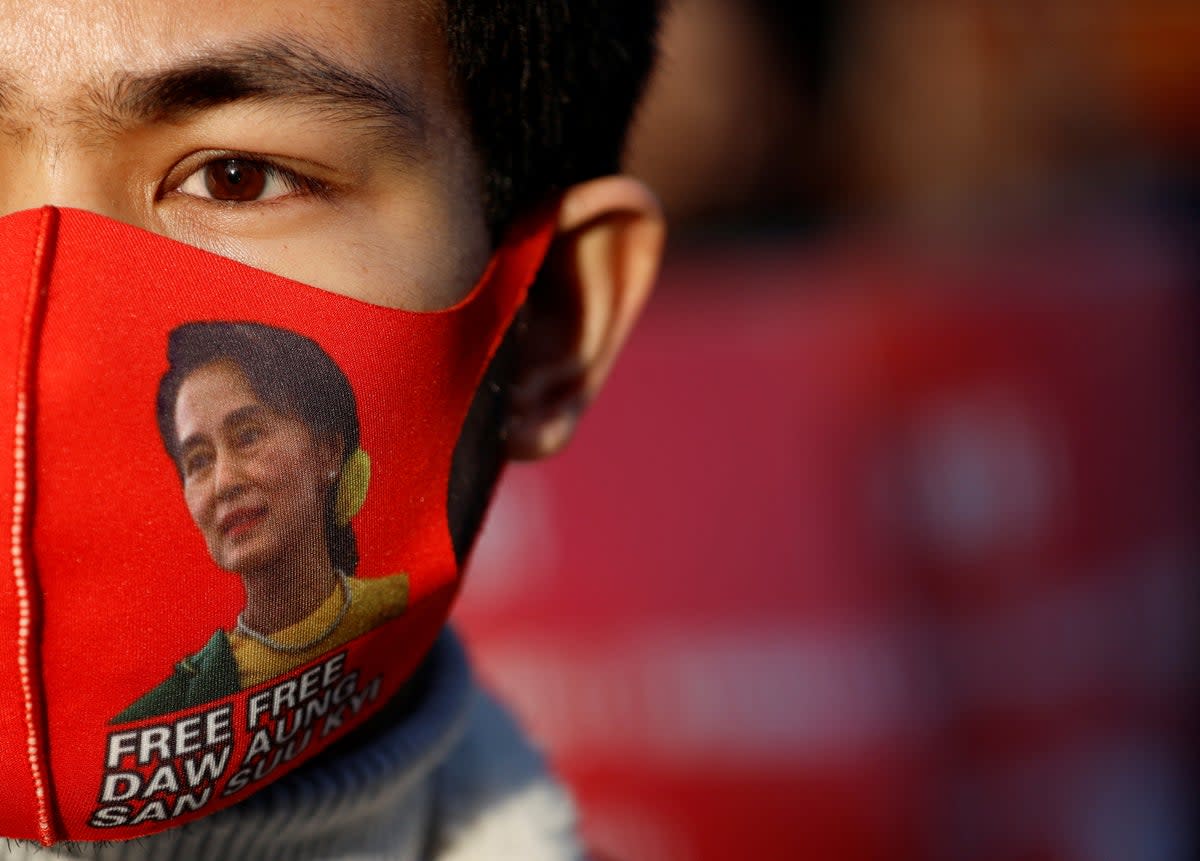With 3,000 killed, 17,000 jailed and 1.2m displaced, Myanmar counts devastating cost of two years since coup
Protesters in Myanmar marked the second anniversary of the military coup with a “silent strike” and renewed vows to restore the democracy that was wrested from them.
The country has been gripped by a bloody civil war since a junta led by General Min Aung Hlaing toppled the elected government of Aung San Suu Kyi.
Pro-democracy groups on Wednesday asked civilians to stay at home to show strength and solidarity in the face of the junta's violent crackdown on dissent and free speech. The opposition’s General Strike Coordination Body, which was formed after the coup, urged people to stay inside in their homes or workplaces from 10am to 3pm local time.
Photos and videos shared on social media showed empty streets in Yangon, the commercial hub and former capital city, with barely a few vehicles and mostly empty buses plying the roads. Streets leading to the famous Buddhist shrine Shwedagon, which is usually thronged by worshippers, were also deserted.
Elsewhere, small groups staged peaceful protests against military rule. In neighbouring Thailand, hundreds of anti-coup protesters held a rally outside Myanmar's embassy in the capital.
Chants of “we are the people, we have the future” and “the revolution must prevail” reverberated in the air as more people poured in with pictures of the ousted leader, calling for her release.
Ms Suu Kyi, 77, is serving multiple prison sentences totaling 33 years after being convicted in a series of charges brought by the military. Her party say the charges are all politically motivated.
“This year is decisive for us to completely uproot the military regime,” Acchariya, a Buddhist monk attending the Thailand rally, told Reuters.

The junta’s rule has plunged the country into an economic as well as security crisis, derailing decades of progressive reforms and inviting fresh international sanctions.
Nearly 1.2 million people have been internally displaced and over 70,000 have left the country in the two years since the coup, the UN estimates. The Independent Assistance Association for Political Prisoners, a watchdog group that tracks killings and arrests, claims at least 2,940 civilians have been killed by the authorities.
Another 17,572 have been arrested since 1 February 2021, with 13,763 of them still behind bars.
The junta originally justified its coup by arguing that a general election in 2020 was rigged against the main military-backed political party, claims which were not endorsed by international observers. It now describes its crackdown on dissenters as a legitimate campaign against “terrorists”, lumping protesters in with the militant groups that have long operated on the country’s fringes.

On Wednesday Min Aung Hlaing said the military will protect the country’s constitution and that multi-party elections must be held. The general did not provide a timeline for any possible elections to be held and also requested the National Defence and Security Council to extend a state of emergency, which has been in place since the coup in 2021, be extended for another six months because the situation in the country remains “unusual”. That request was later granted.
“The level of violence involving both armed combatants and civilians is alarming and unexpected,” said Min Zaw Oo, a veteran political activist in exile who founded the Myanmar Institute for Peace and Security.
“The scale of the killing and harm inflicted on civilians has been devastating, and unlike anything we have seen in the country in recent memory,” he told the Associated Press.
Myanmar was hit with fresh sanctions on Tuesday on the eve of the two-year anniversary. The US Treasury placed sanctions on its energy minister Myo Myint Oo and the top two officials of the state-owned Myanma Oil and Gas Enterprise.
The sanctions, similar to those announced by Canada and Britain, were imposed after Myanmar’s junta cast fresh doubt on its tentative plans to hold new elections, saying the country had “not returned to normalcy”.
Meanwhile, Indonesia is reportedly planning to send a top general to Myanmar to talk to its junta leaders in the hope of showing the country how to make a peaceful transition to democracy.
Jakarta, which is the chair of the Association of Southeast Asian Nations (Asean) this year, is aiming to resolve the region’s perennial problem of the suppression of democracy.
“This is a matter of approach. We have the experience, here in Indonesia, the situation was the same,” President Joko Widodo said.
Anthony Blinken, the US secretary of state, said in a statement that he welcomed Asean’s efforts “to urge the regime to end the crisis”.
“The [Myanmar] regime’s ongoing scorched-earth campaign continues to inflict harm and claim the lives of innocent people, fueling a worsening armed conflict within Burma and insecurity beyond its borders,” he said.
